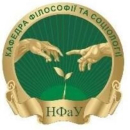methodical materials on philosophy
Методичні рекоменації ПМК Філософія укр.
Методичка для семинаров философия рус.яз.
The topics for lectures
MODULE I. History of philosophy
- Philosophy, its content and place in culture
- Philosophical thought of Ancient East
- Antique Philosophy
- History of Philosophy of Modern Era
- Non-classical philosophy of XIX – XX centuries
MODULE II. Theoretical and practical philosophy
- Ontology as a theory of reality
- Epistemology. The problems of cognition
- Philosophical Anthropology and Social Philosophy
The topics for seminars
MODULE I. History of philosophy
- Philosophy, its content and place in culture
- Philosophical thought of Ancient East
- Antique Philosophy
- Medieval Philosophy
- Philosophy of the New Time
- German Classical Philosophy
- Non-Classical Philosophy
MODULE II. Theoretical and practical philosophy
- Ontology as a theory of reality
- Epistemology. The problems of cognition
- Philosophical Anthropology, Axiology and Social Philosophy
Questions to the final module control № 1
- Philosophy as a type of theoretical knowledge: its subject and main questions.
- Philosophy as “love for wisdom”: the problem of definition.
- Structure and functions of philosophy.
- The concept of worldview, its definition and essence.
- Mythology and religion as two historical types of worldview
- Philosophy as a historical type of worldview.
- Philosophy and its cultural role.
- Origins of philosophy: main historical and theoretical factors.
- Oriental philosophy of Ancient era: schools, tendencies, ideas.
- Buddhism as religious and philosophical conception.
- Confucianism, its moral and philosophical issues.
- Taoism as an Old Chinese school of philosophy.
- Antique philosophy: periods, problems, representatives.
- Greek pre-Socratic schools.
- Sophists and Socrates: cultural dialogue and theoretical opposition.
- Plato’s objective idealism.
- Aristotle’s metaphysic.
- Cultural background of medieval philosophy. Specific features of theocentric paradigm.
- Medieval apologetics, patrologists and scholastics.
- Arabic thinkers of Middle Ages. IbnRoshd and IbnSina.
- Humanism of Renaissance.
- General characteristics of Modern European philosophy.
- Empiricism, its methodology and scientific principles. F. Bacon.
- Empiricists’ conception of man and society. T. Hobbes, J. Locke.
- Rationalism as a trend of Modern philosophy. R. Descartes.
- Rationalistic anthropology. B. Spinoza.
- Prime features of German classic philosophy.
- I. Kant’s transcendentalism.
- G.W.F. Hegel’s absolute idealism.
- General characteristic of non-classical philosophy.
- F. Nietzsche and his conception of superman.
- Positivism and its philosophical principles. A. Comte.
- Philosophy of Marxism and its historical destiny.
- Existentialism and questions of human being. A. Camus.
Questions to the final module control № 2
- Ontology as a sphere of philosophical knowledge: subject, questions, main ontological approaches.
- Main ontological categories.
- Materialism and idealism and their varieties.
- Epistemology and the problem of cognition.
- Forms and types of cognitive activity.
- Specific features of philosophical methodology.
- Cognition of the world and issue of truth in philosophy and science.
- Deduction and induction as logical foundations of cognitive activity.
- Philosophical anthropology: general characteristics of its subject and problems.
- Human life, death and immorality as anthropological problems.
- Social philosophy. Society as a subject of philosophical investigations.
- Variety of philosophical interpretations of history.
- The philosophy of informational society. Information as social and cultural resource.
- Global world of today and global problems of mankind.
- Philosophy and biomedical ethics.
LITERATURE to the course
- Armstrong A.H., ed., The Cambridge History of Later Greek and Early Medieval Philosophy (1966)
- Copleston F., A History of Philosophy (9 vol., 1985)
- Crystal, David, The Penguin Encyclopedia, Penguin Books, 2004
- Hamlyn D.W., A History of Western Philosophy (1987);
- McGaughey, William, “Rhythm and Self-Consciousness: New Ideals for an Electronic Civilization”, Thistlerose Publications, 2001.
- Popper, Karl R., The Logic of Scientific Discovery, Routledge, 2002.
- Scruton R, Modern Philosophy: An Introduction and Survey (1995)
- www.textbooks.com/Catalog/H4/Philosophy
- www.valorebooks.com/new-used-textbooks/philosophy
- www.barnesandnoble.com/s/philosophy
- Філософія http://pharmel.kharkiv.edu/moodle/course/view.php?id=1063


